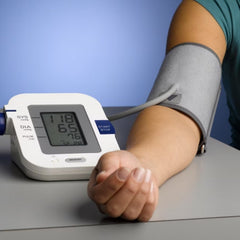10 Early Warning Signs of Parkinson’s Disease—Even One Should Raise Concern! How to Prevent It
Table of Contents:
- 10 Early Warning Signs of Parkinson’s Disease You Shouldn’t Ignore
- Five Ways to Help Prevent Parkinson’s Disease
- Maintain a Balanced Diet and Drink Tea in Moderation
- Avoid Exposure to Harmful Substances
- Stay Physically Active
- Get Regular Health Screenings and Seek Timely Medical Care
- Manage Related Health Conditions Proactively
- FAQs about Parkinson's
Trembling hands, slow movements, stiff facial expressions… You might think it’s just a sign of aging, but be careful—these could be symptoms of Parkinson’s disease. In reality, Parkinson’s doesn’t arrive without warning. Many early signals are often overlooked. Today, let’s take a closer look at Parkinson’s disease to help ensure early detection, timely diagnosis, and prompt treatment.

10 Early Warning Signs of Parkinson’s Disease You Shouldn’t Ignore
- Tremors in the Hands: Involuntary shaking often occurs when the body is at rest and tends to lessen during activity. The tremors may affect the hands, legs, jaw, tongue, or head.
- Poor Sleep Quality: Frequent insomnia or waking up often at night, excessive daytime sleepiness, or acting out dreams—such as punching, kicking, or yelling while asleep—can all be early signs.
- Shrinking Handwriting: Handwriting may become smaller, cramped, and increasingly illegible. Writing may feel difficult or require more effort than usual.
- Changes in Voice: Speech may become softer, hoarse, unclear, or faster than normal. These changes may be subtle but progressive.
- Diminished Sense of Smell: Loss of smell or a decreased ability to identify food aromas or the source of odors is another possible early indicator.
- Difficulty Walking: Walking may become slower, with reduced arm swing or changes in gait—such as dragging the feet, taking short shuffling steps, or difficulty initiating movement.
- Orthostatic Hypotension: Dizziness or lightheadedness upon standing up from a sitting or squatting position, and in severe cases, even fainting, can occur due to a sudden drop in blood pressure.
- Chronic Constipation: Persistent difficulty with bowel movements, needing more than 30 minutes per attempt or going more than two days without a bowel movement, can be an early warning sign.
- Mask-like Facial Expression: A reduced range of facial expressions, less frequent blinking, or a fixed stare may give the appearance of wearing a “mask.”
- Stooped Posture: Leaning forward or to one side when standing or walking, with a noticeable hunch in the upper body.
Five Ways to Help Prevent Parkinson’s Disease
Although the exact causes of Parkinson’s disease are still not fully understood, research suggests that certain healthy lifestyle habits and environmental factors may help reduce the risk. Here are five recommended preventive strategies:
Maintain a Balanced Diet and Drink Tea in Moderation
Ensure an adequate daily intake of fresh fruits and vegetables, while avoiding high-sugar and high-fat diets. Drinking green tea or coffee in moderation may also be beneficial.
Avoid Exposure to Harmful Substances
Environmental toxins such as pesticides and heavy metals may increase the risk of Parkinson’s. It’s important to minimize exposure in both daily life and the workplace and to take proper protective measures when necessary.
Stay Physically Active
Regular exercise—such as Tai Chi, walking, or swimming—can help improve blood flow to the brain, support neural connectivity, and enhance neuroplasticity through feedback mechanisms. It also helps maintain cognitive function and motor control.
Get Regular Health Screenings and Seek Timely Medical Care
Middle-aged and older adults should undergo routine comprehensive checkups, including neurological assessments. If any of the above symptoms appear, they should not be ignored—monitor any changes and consult a doctor promptly.
Manage Related Health Conditions Proactively
Chronic conditions such as hypertension, diabetes, and atherosclerosis may elevate the risk of developing Parkinson’s disease. Managing and controlling these underlying conditions is an important part of prevention.
FAQs about Parkinson's
Is Parkinson's Disease an Autoimmune Disease?
Parkinson's Disease does involve some autoimmune factors, as recent studies have shown that the immune system may mistakenly attack certain brain cells. However, it is not yet fully classified as an autoimmune disease. More research is needed to understand the exact role of the immune system in its development and progression.
Can Parkinson's Disease be Cured?
No, Parkinson's Disease cannot be cured at present. While there are treatments available that can help manage symptoms and improve quality of life, there is currently no known cure for the disease.
Does Parkinson's Affect the Brain?
Yes, Parkinson's disease affects the brain by causing certain nerve cells (neurons) to weaken and become damaged over time. It is a progressive movement disorder of the nervous system, mainly impacting areas of the brain that control movement. As these neurons deteriorate, especially those that produce dopamine, communication within the brain is disrupted, leading to symptoms like tremors, stiffness, and difficulty with balance and coordination.
Does Parkinson's Disease Affect Memory?
Yes, Parkinson's disease can affect memory. Some people with Parkinson's may develop cognitive problems, including difficulties with memory, attention, and problem-solving. In more advanced stages, some individuals may experience dementia, which significantly impacts memory and thinking abilities.





